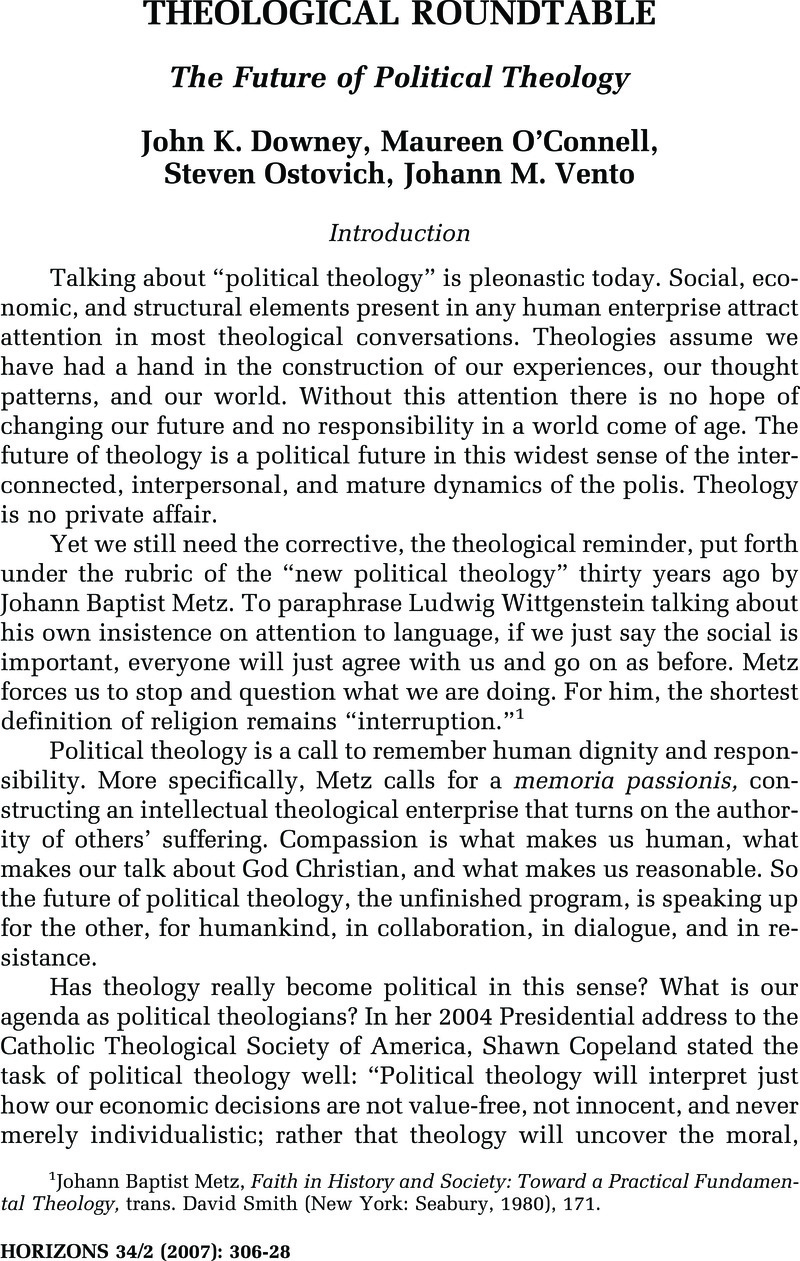No CrossRef data available.
Published online by Cambridge University Press: 18 March 2013

35 Gorka, John, “Gypsy Lives,” Temporary Road, High Street 10315 (CD, 1992).Google Scholar
36 Vento, Johann M., “Not in Vain: Memoria Passionis and Violence against Women,” in Missing God?, 79–92.Google Scholar
37 Metz uses this phrase in The Emergent Church: The Future of Christianity in a Postbourgeois World, trans. Mann, Peter (New York: Crossroad, 1981), 99.Google Scholar
38 Fiorenza, Elisabeth Schüssler, In Memory of Her (New York: Crossroad, 1983), 31.Google Scholar
39 Fiorenza, Elisabeth Schüssler, “A Discipleship of Equals: Ekklesial Democracy and Patriarchy in Biblical Perspective,” in A Democratic Catholic Church: The Reconstruction of Roman Catholicism, ed. Bianchi, Eugene C. and Ruether, Rosemary Radford (New York: Crossroad, 1992), 18.Google Scholar
40 For a treatment of the loss of agency through traumatic violence and its re-establishment in the process of recovery, see Herman, Judith, Trauma and Recovery: The Aftermath of Violence—From Domestic Abuse to Political Terror (New York: Basic Books, 1992).Google Scholar
41 For a consideration of the dynamics of victimization, trauma, and recovery among victims of the Shoah and an argument in favor of the importance of mourning in recovery, see LaCapra, Dominick, Representing the Holocaust: History, Theory, and Trauma (Ithaca: Cornell University Press, 1994)Google Scholar and History and Memory After Auschwitz (Ithaca: Cornell University Press, 1998).
42 Ostovich, Steven T., “Melancholy History,” in Missng God, 93–101.Google Scholar
43 Fiorenza, Elisabeth Schüssler, Bread Not Stone: The Challenge of Feminist Biblical Interpretation (Beacon Press, 1995), xv.Google Scholar
44 See Bentley, Sarah, “Bringing Justice Home: The Challenge of the Battered Women's Movement for Christian Social Ethics,” in Violence Against Women and Children: A Christian Theological Sourcebook, ed. Adams, Carol J. and Fortune, Maria M. (New York: Continuum, 1995), 152–71.Google Scholar
45 See Herman, 235–36; see also Huff, Margaret Craddock, “The Interdependent Self: An Integrated Concept from Feminist Theology and Feminist Psychology” Philosophy and Theology 2 (Winter 1987): 160–72.CrossRefGoogle Scholar
46 These formal experiences of dialogue have occurred through a long association with the National Conference for Community and Justice (formerly the National Conference of Christians and Jews) in their (now defunct) Theology in a Pluralistic Setting program, and most recently with the Elijah Interfaith Institute Think Tank, whose current project explores the possibility of sharing wisdom among religious traditions on the topic of love and forgiveness.
47 Metz, Johann Baptist, Memoria Passionis, 175–78.Google Scholar
48 Metz, Johann Baptist, “Christianity in a Globalized World: Faith, Politics and the Memoria Passionis,” translated and delivered by Ashley, James Matthew, Religion and Postmodernism Conference, Villanova University, October 26, 2006, par. 28.Google Scholar
49 The literature on socially engaged Buddhism is vast and growing. For one example, see Queen, Christopher S. and King, Sallie B., Engaged Buddhism: Buddhist Liberation Movements in Asia (Albany: SUNY Press, 1996).Google Scholar While there is a long tradition of “socially engaged Hinduism” (in the modern period dating to Swami Vivekananda), the use of the phrase among Hindus is recent and not yet widespread. For a contemporary Hindu theologian re-evaluating his religious tradition in light of the struggle for caste and gender justice, see Rambachan, Anantanand, The Advaita Worldview: God, World, And Humanity (Albany: SUNY Press, 2006).Google Scholar